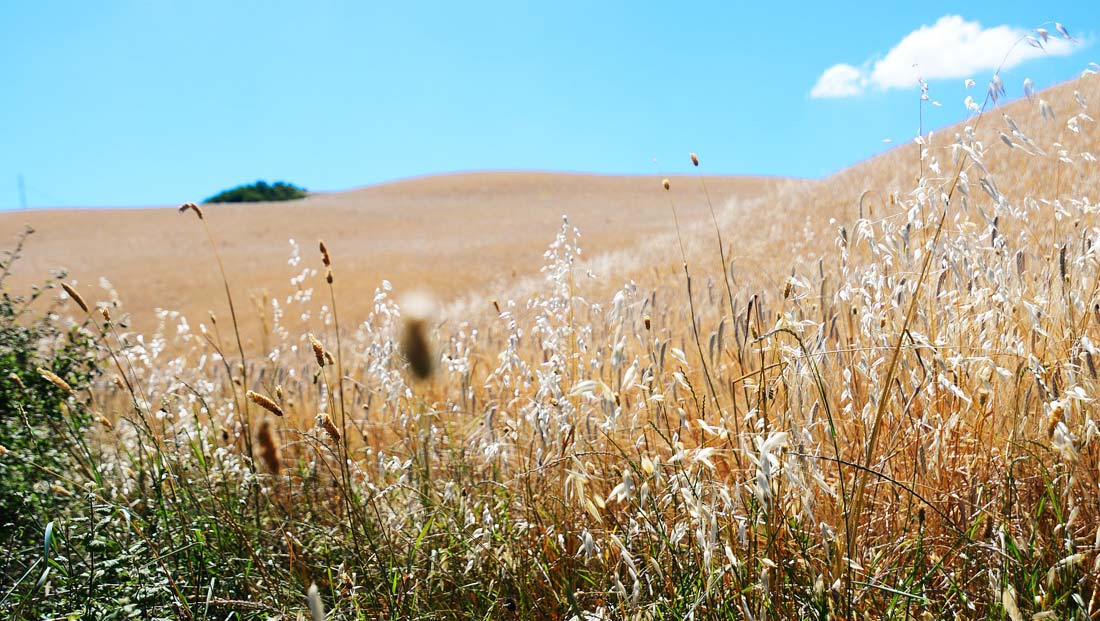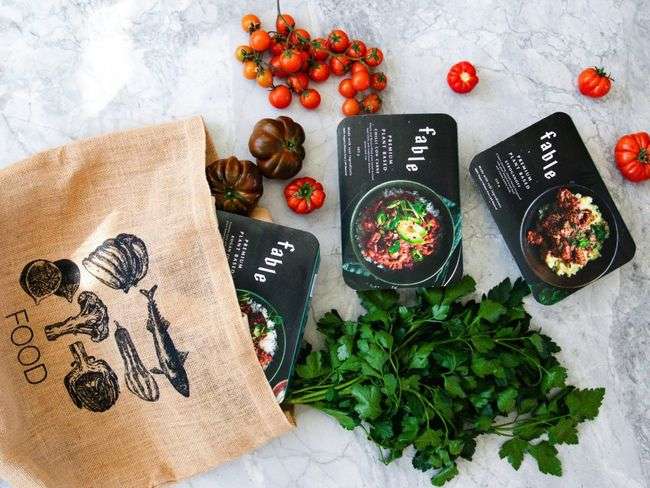
Leaving behind animal agriculture and fishing should not necessarily mean an end to the farmer’s role in food production. This scenario is distinctly problematic when you consider the UK’s poor record on food sovereignty and severe decline in home-grown fruit and vegetables. The Landworker’s Alliance state the need for a massive scaling up of horticultural production by around 66% if we want to meet the ‘seven a day’ recommendation by Public Health England 1https://landworkersalliance.org.uk/new-deal-for-horticulture-2/. Despite being one of the most productive, economically viable and environmentally and socially sound forms of production, horticulture represents just 1% of all UK agricultural land. There is an urgent need to repurpose land for growing food if we are going to continue to feed the population.
What if UK animal farmers made the switch to growing food instead?
We understand that not all grazed land is suitable for crops, however even on marginal land we have solutions to cultivate and raise soil organic matter. The transition away from animal agriculture presents a unique opportunity to make rural areas and our food supply more resilient to the coming challenges of climate change. Instead of importing vast amounts of plant-based food, home-grown fruits, vegetables, nuts and legumes would make up the 50% increase to our diets recommended by the EAT Lancet report on food, planet and health 2https://eatforum.org/eat-lancet-commission/
Veganic Growing
Conventional agriculture is highly industrialised and reliant on chemical fertilisers 3https://publications.parliament.uk/pa/cm201719/cmselect/cmenvaud/656/65607.htm for producing high yields, particularly the greenhouse gas nitrogen. The manure used is from animals kept for food and the system locks-in the use of animals due to its reliance on animal outputs. These methods have resulted in a severe loss of biodiversity and a decline in soil health that threatens our food supply and increases the risk of erosion and flooding. Agro-ecological and stock-free, organic agriculture uses ‘green manures’ to provide the organic matter and nutrient needed for plants to grow and improve soil quality. These are fast-growing plants that improve soil quality and are cut or dug into the soil as mulch when the ground is being prepared for planting. The benefits to green manures sown directly on the soil or under larger crops include controlling weeds, nitrogen lifting and fixing, encouraging insect populations to control pests and attracting bees and other pollinators. Common green manures are Crimson Clover, Trefoil, Lucerne, Buckwheat and nettles. Organisation such as the Vegan Organic Network and Farmers for Stock-Free Farming Scotland are pioneering the use of animal-free methods of farming and helping farmers across the country to farm in a more environmentally sound manner. Tolhurst Farms is excellent example of what is possible.
Converting from animal farming is huge step to take. Going straight to veganic farming is an even more daunting process and we recognise that there are steps along the way in any transition. That is why we support farmers no matter what that journey looks like for them. The Biocyclic Vegan Standard takes into account that any transition in not going to happen overnight and gives a leeway of five years to completely change to animal input-free farming to allow farmers to adapt to changes and new markets.
Fava beans, split peas, chickpeas, lupins, chia seeds, hemp, oats, wheat… these are just some of the many diverse ‘protein crops’ containing a complex range of amino acids vital for human health. They have been frequently acknowledged as a solution the problems of food security, soil degradation and the public health crisis. Legumes, pulses, nuts, seeds and grains are nutritious and offer a low-cost option, high protein, ethical and environmentally-friendly option to British consumers compared to animal protein 7https://pubmed.ncbi.nlm.nih.gov/26985617/8https://eatforum.org/eat-lancet-commission/.
In spite of the enormous potential of protein crops, production has actually decreased over the last few decades rather than been boosted by investment and incentives. The UK currently assigns only 16% of its agricultural land to growing protein crops 9https://www.vegansociety.com/sites/default/files/Grow%20Green%202%20Full%20Report_0.pdf. This is all while demand has actually increased due to the explosion of the plant-based market and the use of alternative proteins in the form of meat replacements – in fact, retail giant, Tesco, has pledged to a 300% increase in sales of its meat replacements by 2025 after seeing sales increase by 50% in 2020 10https://www.tescoplc.com/news/2020/tesco-commits-to-300-sales-increase-in-meat-alternatives/. Given that the meat replacement market is set to reach 25.7 million in 2025 11https://www.vegansociety.com/news/market-insights/meat-alternative-market/european-meat-alternative-market/uk-meat-alternative-market and plant-based companies, such as Oatly hoping to open an oat milk production plant in Peterborough, are developing the infrastructure needed to produce these proteins 12https://www.bbc.co.uk/news/uk-england-cambridgeshire-56336609, it a very lucrative option for UK farmers. We currently rely on imports to meet this demand and the UK also feeds a sizeable amount of protein imports to animals as feed 13https://www.efeca.com/wp-content/uploads/2019/12/UK-RT-on-Sustainable-Soya-APR-2019-final.pdf, leaving a gap for animal farmers to potentially fill.
Protein crops can have beneficial impacts on the soil in addition to human health. Legumes and pulses are nitrogen-fixing, meaning that they draw nitrogen from the air and store it in their roots. They therefore do not need nitrogen fertilisers and avoid leeching polluting nitrates into the water table. They can also used in crop rotations to improve soil microbial quantity and benefit the next crop. Eliminating the need for farming to rely on animal manure also reduces the risk of contamination and disease like E.coli.
Roger Vickers, Chief Executive of the Processors and Growers Research Organisation (PGRO) and author of the ‘Blueprint for UK Pulses’ said: “The changes and challenges of Brexit present an opportunity for growers, researchers and traders to realise the full potential of pulses (protein crops/legumes such as dry peas and beans/vegetable legumes). There are key benefits to be gained as the evidence for pulses and the environment shows clearly that their inclusion in farming rotations significantly improves biodiversity, crop productivity and soil fertility – while reducing greenhouse gas emissions and pollution” 14https://www.pgro.org/blueprint-for-uk-pulses/#:~:text=Blueprint%20for%20UK%20Pulses%20In%20the%20spring%20of,the%20challenge%20of%20future%20funding%20for%20UK%20agriculture..

Hodmedods was founded in 2012 by Nick Saltmarsh, Josiah Meldrum and William Hudson to work with British farms to source high-quality beans and pulses. They were inspired to create the company following a project by the East Anglia Food Link and Transition City Norwich looking at what would constitute a more resilient diet suitable for our climate and would lead to a reduction in meat consumption.
“One of the things that became really clear was that we needed to eat more beans and peas, not only because they’re a good substitute for meat, but also because they’re important in agricultural rotations – they fix nitrogen, they’re a good break crop from cereal growing”, said Josiah Meldrum.
Trialling with British-grown fava beans, they have been so successful that they have branched out into less well-known heritage crops such as black badger peas and quinoa. The main issue they faced was that most beans were being sold for export and grain dealers did not have infrastructure to deal with smaller quantities. The fact is UK consumers are not used to used to eating beans so it is really important to make them as attractive as possible.
Still, Meldrum goes on to say, “I think increasingly there’s a broader awareness that we’re going to have to change our diet in some way over the next 30 or 40 years. There are pressures from population growth, pressures on land. Beans are going to play a part in that as a very low-tech solution to dietary change”.
Paludiculture or ‘wet farming’ is the practice of farming on peatlands, such as rewetted bogs and fens. Peatlands are a vital part of the ecosystem covering 3% of the global land surface. They are by nature constantly waterlogged and slow down the process of plant decomposition and form peat soil. Carbon is fixed from the atmosphere in these plant tissues via photosynthesis and locked into peat soils creating the largest natural carbon store on Earth. Drainage for agricultural use has released greenhouse gases into the atmosphere and the protection of peatlands is necessary to combat climate change. These areas also help reduce the risk of flooding and drought by holding back seawater and are home to a variety of diverse species 23https://www.iucn.org/resources/issues-briefs/peatlands-and-climate-change. In the UK, peatlands cover 10% of landmass and an estimated 80% have been damaged in some way for arable and animal farming 24https://www.iucn-uk-peatlandprogramme.org/about-peatlands/uk-peatlands. Most peatlands can be found in the East Anglian Fens, Somerset Levels and in the lowlands of Northern England.
There is a great potential for paludiculture to reduce the high greenhouse gas emissions from peatlands used for agriculture. This requires raising the water level and new ways of growing crops capable of thriving in elevated water tables. Research suggests that paludiculture could become carbon sinks and help the UK meet its climate change targets 25https://lowlandpeat.ceh.ac.uk/sites/default/files/Policy%20Brief%20WP1.pdf. In fact, the government has promised £10m towards restoring peatlands as part of its 25 Year Environment Plan 26https://www.gov.uk/government/publications/25-year-environment-plan.
A wide variety of crops exist which could be economically viable under paludiculture farming. Growing bioenergy crops, Sphagnum, celery, watercress, wild rice, edible tubers, water peppers, other novel crops, medicines and construction materials are possible in waterlogged areas. With the subsidy system in the UK shifting to money for ‘public goods’, it is likely farmers will be rewarded for protecting peatlands.
Bedfordshire, Cambridgeshire and Northamptonshire (BCN) Wildlife Trust is testing out paludiculture crops in East Anglia’s Fens as part of the £1m Water Works Project. A five hectare area has been marked out to demonstrate that crops including a wild grain (manna grass), Bulrush, Sphagnum, Wild Celery, Watercress, Meadow Sweet and Bog Myrtle can be grown commercially.
The project will measure carbon levels and monitor wildlife. The project’s manager, Kate Carver, said they were looking to attract chefs and gin companies who might want to use the products grown.

The media has been talking quite a bit about vertical farming recently – and with good reason! Vertical farming takes the farm inside and grows crops stacks on top of each other in vertical layers. This means food can be grown anywhere from shipping containers to disused mines and in any climate. Vertical farming systems either use hydroponics (using mineral nutrient solutions in an aqueous solvent) or aeroponics (see below). Having complete control over the environment means that minimal water is used, no pesticides are needed and there is year-round crop production and higher yields.

Fischer Farms is building a new £25m vertical farm right here in the UK. When the 4 acre site is constructed it will be the world’s largest vertical farm. It will join the company’s existing large vertical farm facility in Staffordshire to grow a range of leafy green products.
CEO Tristan Fischer says, “Vertical farming enables us to be much more productive using less space. We can grow the same amount of food in our four acre building that you would take 1,000 acres of conventional British farmland. We will do it without using pesticides, herbicides or insecticides”.
“There is a soil crisis, so we didn’t want to use soil. There is a water crisis, so we wanted a system that used almost zero water. There is a pollution crisis from field run off, so we didn’t want to contaminate waterways. CO2 emissions are causing climate chaos, so we wanted our farms to be powered by renewable energy.”
Aeroponics is a system where the whole plant, including the roots, is grown suspended in mid-air in specially constructed grow rooms. It is the fastest way to grow plants and does not require any soil or aggregate medium to support it. Instead, the roots are exposed to mist containing micro-droplets of the nutrients they need to grow. The roots have better access to oxygen which significantly increases growth rate and give increased yields. This advanced method of growth, flowering, and fruiting is suitable for growing microgreens, leafy greens, salads, herbs, fruits, carrots, tomatoes and radishes. Aeroponics is most often used for indoor growth in greenhouses and specialist grow rooms, however it has been successful outdoors on large or tall plants in the UK. The systems can be installed in repurposed agricultural buildings, particularly chicken and pig sheds.
What are the benefits of aeroponics? It uses up to 95% less water than conventional outdoor farming and with no need for pesticides or harmful fertilisers, there is no runoff into waterways. Economically, it can produce year-round harvests and a constant sales projection.
Founded by Charlie Guy, Jack Farmer and Ben Crowther in 2015, LettUs Grow is a team of growers, engineers, plant scientists, software developers and business experts who have developed aeroponic technology and farm management software for indoor and vertical farms.
The company is focused on reducing the environmentally impact of agriculture and improving our food system by combating climate change and providing health food that can be grown locally.
Their Ostara farm software is a platform used to monitor their indoor farms. They even grow in repurposed shipping containers that can be dropped anywhere to provide food on the spot!
TemiOdanye, Mechanical and Systems Engineer, writes, “It is our hope that the profitability, usability and sustainability of our farms will inspire members of the agriculture and food retail industries to diversify and explore the benefits of aeroponics. This could help to alleviate some of the pressure we are placing on our soil and atmosphere and allow us to manage our land and food production more conscientiously”.

Mushrooms have been used for decades in meat replacements in the form of mycoprotein – the basis for Quorn products. Today, speciality mushrooms and meat replacements are seeing a surge in popularity. There are around 580 commercial mushroom farms in the UK with sales around £200m and it has never been easier to enter the industry thanks to new tech advances 31http://www.davidmoore.org.uk/Assets/Mostly_Mycology/Richard_Clarke/SAC_Advice2mushroomgrowers.pdf.
With no methane from grazing animals and reduced land use, mushrooms have a much lower carbon footprint than meat and dairy. Existing facilities such as chicken shed and cold stores can be retrofitted to house mushroom grow rooms. That’s exactly what pig farmers Jerry and Steve Carroll did in the USA and now they grow seven different types of mushroom such as Lion’s Mane and King Trumpet, as well as mushroom health supplements.
‘Wild’ mushrooms can bring in high income (the smallest UK mushroom farms have an annual turnover of £100,000) and businesses such as ‘Humungus Fungus’ have developed systems that can produce large quantities in small spaces 32https://www.permaculture.co.uk/articles/make-living-growing-mushrooms. Mushrooms can be grown in a variety of ways, on logs, woodchip, hedge trimmings, sawdust, compost, newspaper, coffee grinds, grass cuttings, and leaves.

Lead by mycologist Jim Fuller and his co-founders Michael Fox and Chris McLoghlin, Australian Fable Food Co produce plant-based meat alternatives from mushrooms. They wanted to mimic slow-cooked meats like pulled pork, braised beef and beef brisket and launched their Plant-Based Braised Beef in 2020 to great acclaim with their ‘meats’ being used by Michelin Star celebrity chef Heston Blumenthal.
Currently only available in the UK sold directly to restaurants, Fable says, ““We’re continually developing delicious meaty mushroom products to make it as easy as possible for people to eat less meat. We want to inspire people to make healthier and sustainable food choices, and we believe that people shouldn’t have to compromise on taste or quality to do so”.
In sourcing their mushrooms they only have to look towards co-founder Chris who owns Australia’s largest Organic Mushroom Farm and was Australian Organic Farmer of the Year and Australian Young Farmer of the Year in 2018.
